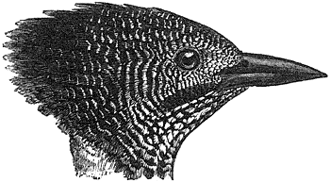| Page 20 | prev page next page | ||
Genus Miglyptes, Swainson, 1837 The bill is of moderate length, culmen much curved. No nasal ridge. Nostrils round, exposed. The chin-angle halfway between gape and tip. Fourth or outer hind toe longer than third or outer front toe. First toe (hallux) short. A nuchal crest. Wing rounded; all tail- feathers pointed, the outer pair just extending beyond the lower coverts. Plumage brown or black and buff, more or less in alternating bars. This genus is restricted to Burma and the Malay countries, the three species being found in Burma. The coloration is peculiar and the habits are imperfectly known, the nest not having hitherto been found.
Miglyptes grammithorax Fulvous-rumped Barred Woodpecker
Coloration: Bill black. Irides deep brown or dull red. the edge of the eyelids black. The legs and the feet are dirty green (Davison). Male Lores, anterior half of orbital region, the point of the chin, the lower back and the rump uniform buff. A malar stripe pale crimson. Remainder of the bird blackish brown barred with buff, very closely on the bead and neck all round and on the breast, the barring becoming wider behind and still wider on the abdomen, but the bars are broader still on the back, scapulars, wing-coverts, tertiaries, and upper tail-coverts. the wing and the tail-feathers with buff spots on both webs. Under wing-coverts and axiilaries buff with a few dark brown spots. Female. No malar stripe. Size: Length 7; tail 2; wing 3.9; tarsus 0.8; bill from gape 0.9. Distribution: The Malay peninsula, Sumatra and Borneo, extending north into Tenasserim as far as the base of Nwalabo mountain, near Tavoy. Habits: As described by Davison, it is usually found in dense tree jungle, and generally in pairs. It is never seen on the ground, but always on trunks and branches of trees. The note of all three species of Miglyptes is similar a rolling kirr-r-r.
The true M. tristis is confined to Java and has the middle of the
breast and abdomen black without bars. Specimens of M. grammithorax
from Nwalabo, Tenasserim, have the breast and abdomen brown, almost without
bars, but not black. | |||
|
Coloration: Upper mandible black, lower mandible plumbeous blue, in some greenish; irides brown; legs and feet dull or brownish green.Male. Dull dark olive or brownish olive, head uniform and unbarred above and on the sides; a crimson malar band. A large buff patch on each side of the neck. Back, scapulars, rump, tail, and wing-coverts with narrow buff cross-bars through out; quills with small marginal buff spots on the outer, and larger spots on the inner webs; tail-feathers with narrow bars interrupted near the shaft; chin and throat very finely barred with buff; foreneck uniform blackish brown; breast and abdomen dark brown with narrow buff bands; middle of breast almost uniform; lower wing-coverts and top of wing buff. Female. No crimson malar band. Size: Length 8.6; tail 2.7; wing 4.1; tarsus 0.9; bill from gape 1.1 Distribution: The Malay peninsula, Sumatra, and Borneo, ranging into the extreme south of Tenasserim. Habits: Very similar to those of the last species, this Woodpecker being found in dense forest.
Fig. 15 - head of M. jugularis Coloration: Bill black; iris dark brown; eyelids dark plumbeous; legs dull bluish, claws horny brown (Oates). Male. Black or brownish black, except two large patches, one on each side of the neck, extending round the hind neck, and forming a demi-collar, the rump, but not the tail-coverts, a large space on each wing consisting of all the minor coverts and of the innermost major and median coverts and tertiaries, the edge of the wing and wing-lining, which are pure buff. A malar stripe on each side with the feathers tipped red. Forehead, crown, and sides of head narrowly barred across with buff. Chin black and buff mixed in small subequal spots. Quills with small submarginal spots on the outer webs and large spots on the inner, the latter wanting near the tip and increasing in size near the base. A few buff bars on the flanks and thigh-coverts. Tail uniform. The female wants the red malar stripe. Size: Length 7.5; tail 2; wing 4; tarsus 0.85; bill from gape 1. Distribution: The greater part of Burma (rare in the Arrakan and Pegu hills, and near Toungngoo, more common in Tenasserim), as far south as Tavoy; also Siam and Cochin China.
Habits: This Woodpecker is found in high forests, but has also been
observed by Davison in large clearings, open jungle, and even in
bamboo-jungle. It closely resembles Hemicercus canente in coloration. | |||
| prev page :: next page | |||
 birding.in
birding.in
| Birds | Bird Diagram | Ornithology | Indian Sites | Bird Watching | Migration | North India | Birds of India | Haryana |
All rights reserved. Copyright © 2005-2013 Birds and birding in India. Disclaimer
website: Free Java Guide & Tutorials
